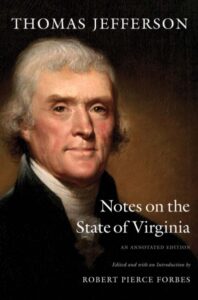 After the U.S. Constitution and the Federalist Papers, Thomas Jefferson’s Notes on the State of Virginia is perhaps the most important and enlightening document from the revolutionary period of the United States that should be read and pondered by those seeking to understand the foundational history of the nation. For those unfamiliar with it, Mr. Jefferson’s book, published in 1875, is an outline of the geography, natural history, people, social practices, and political organization to be found in Virginia as it existed at that time. However, just as anyone reading the other two previously mentioned documents is not advised to do so without the aid of a commentary that presents them in their time, presenting information on events, practices, and even aspects of the English language that have been forgotten or changed over the intervening years, so Notes should likewise only be approached with ready access to such elaborating material.
After the U.S. Constitution and the Federalist Papers, Thomas Jefferson’s Notes on the State of Virginia is perhaps the most important and enlightening document from the revolutionary period of the United States that should be read and pondered by those seeking to understand the foundational history of the nation. For those unfamiliar with it, Mr. Jefferson’s book, published in 1875, is an outline of the geography, natural history, people, social practices, and political organization to be found in Virginia as it existed at that time. However, just as anyone reading the other two previously mentioned documents is not advised to do so without the aid of a commentary that presents them in their time, presenting information on events, practices, and even aspects of the English language that have been forgotten or changed over the intervening years, so Notes should likewise only be approached with ready access to such elaborating material.
Fortunately, for those interested in taking up Mr. Jefferson’s book, a new, fully annotated edition of Notes on the State of Virginia has recently been published by Yale University Press. With a lengthy introduction by Dr. Robert Pierce Forbes that presents the history of the book’s creation, and well situates it and its author in their time, this new edition presents both the first time reader as well as those who have already read it with the opportunity to discover not only what Mr. Jefferson had to say about his beloved home state but also to learn a wealth of fascinating details about both how it was written and the influence it had on the newly formed country both within and abroad.
As this book has significant relevance to the history of natural history in the eighteenth century, particularly in regard to the Jefferson-Buffon debate regarding the deficiency of new world species versus those of the old world, the widespread belief of the time of the immutability of species that would be turned on its head by Charles Darwin, and the manner in which the writings of enlightenment period natural historians such as Mr. Jefferson are interpreted today, I will be revisiting this new edition of Notes in a full feature-length review that will be published in The Well-read Naturalist later this year.
If you enjoyed reading this, please consider signing up for The Well-read Naturalist's newsletter. You'll receive a helpful list of recently published reviews, short essays, and notes about books in your e-mail inbox once each fortnight.
